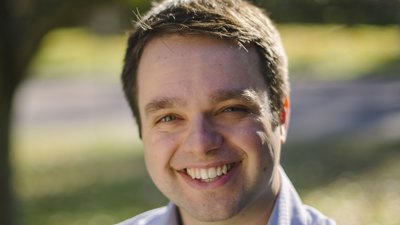
Dr Matt Finn has been awarded the 2023 Taylor and Francis Award for excellence in the practice and promotion of teaching in higher education. We spoke to Matt about his approach to teaching and learning and the influences that have shaped his work.
What are you most proud of in your career to date?
I think the ‘what’ for me is most often a ‘who’! I take delight in the everyday moments where I see people experiencing the positive transformative potential of education and learning that leads to personal and collective growth.
It has become increasingly clear to me that realising education's promise for all isn't inevitable. I’m learning more about how it requires intent, collaboration, openness to challenge, and alertness to the structural conditions of education and society.
Even when there’s more to do, I’m proud of so many groups who put this into practice. For me, that included working with groups of students in schools and at university; academics and professional service staff at the University of Exeter; the Society’s Geographies of Children, Youth and Families Research Group and Geography and Education Research Group (GeogEd); the Geographical Association; the Geography Education Research Collective; the Decolonising Geography group; and Time for Geography.
Is there a particularly memorable project you have worked on?
I’ve loved being involved in the University of Exeter Education Incubator and running two projects, which have connected with work going on across the groups above. My experience has been one where, at Exeter and with amazing colleagues in geography and across the university, we’re enabled to direct our shared intellectual and creative capacities to educational innovation.
I worked with a group of brilliant student co-researchers on a project to explore experiences of undergraduate student transitions to university following the introduction of the reformed A Levels in England. This work has been important in seeking to improve transition experiences of all students, especially those that might experience additional barriers, both at my institution and through a GeogEd event.
How have these experiences shaped what you do?
While there are innumerable people who shape and contribute to cultures of pedagogy and to projects like these, I particularly want to mention working with Professor Sarah Dyer. We have co-taught at Exeter and I’ve learnt so much from her there, as well as through her involvement in the Higher Education Research Group (now GeogEd) and as the inaugural director of the Exeter Education Incubator.
I continue to be struck by the value she puts on collaboration and visibility in education. Collaboration because education can often be individualised/individualising, and visibility because the work of education, and the educator, is often hidden from different audiences – even our students at times, who might see us most.
When we work together in education, there is the potential to make the work of education more humane – we’re more likely to sustain courage and care as educators, and we can learn so much more from each other than we might learn on our own. When we focus on strategies to make education visible, it opens up room for needed challenge and change, and also for recognising and valuing the work of education and the conditions needed to enable that work to take place well.
For me, this has translated into three ideas that, as I look back, have shaped what I’ve done: connecting, resourcing and promoting.
Connecting, as I want to see and strengthen the connections and collaborations across different groups, and areas of scholarship, for the purposes of geography education and research. Resourcing, by producing public resources we can enable new and shared conversations and the social reproduction of, and changes to, the discipline. And promoting, which for me has looked like promoting geography (I think I’ve had the opportunity to talk to 10,000 students exploring studying geography at university); promoting the geographies of education, learning and childhood; and promoting access, inclusion and change for learners who have often experienced barriers and exclusion from geography.
I find it helpful to think of geography as an ongoing and unfinished societal activity – it’s in a process of becoming as people take space in making it what it is and can be.
